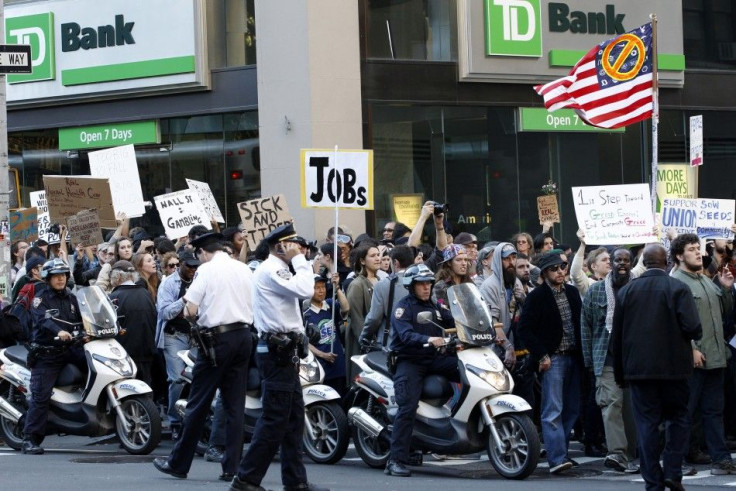Occupy Wall Street: Stronger Without One Specific Demand

Much of the media attention on Occupy Wall Street has centered on the lack of singular demands and unification amongst the hundreds of protesters camped out in Zuccotti Park.
There was a New York Post story on the fart smeller of Occupy Wall Street, multiple stories on the crazies of the movement, as well as detractors pointing out that the movement will never accomplish anything because it doesn't know what it wants.
But Beka Economopoulous, an unofficial media spokeswoman for Occupy Wall Street, told IBTimes that she feels the lack of one specific demand actually gives the movement more strength.
The longer the occupiers don't have demands, the stronger they are, said Economopoulous, a vice president at Fission Strategy, a social media company specializing in strategies for nonprofits and foundations. I don't believe there will be a stand on one particular reform that we want to see happen. We believe the system is fundamentally broken.
Wednesday saw the inclusion of some of New York's biggest unions joining the Occupy Wall Street movement leading to a massive protest in front of Foley Square. The march and protest had more than 15,000 people, according to reports, potentially adding more credence and credibility to the movement.
But there are fears that a leaderless organic group could be co-opted to the union's more organized and concrete motives.
I think Occupy Wall Street movement was incredibly psyched to see the unions, laborers, community organizations, and churches come join us (Wednesday), said Economopolous. It's brought more visibility to the movement.
She admitted that the group does have a cautions relationship with unions, though.
Unions aren't the only ones that have come out and tried to cash in on the movement's momentum. Many local politicians, including City Councilman Jumaane Williams, have come out to lend support to the cause, but Occupy Wall Street has largely ignored the politicians.
(Politicians are ready and willing to attach themselves to Occupy Wall Street, Economopolous said. But people here are suspicious of being co-opted by politicians.
That suspicion stems from a feeling that the political system is largely broken.
The movement, as noted by many, is quite diverse but does have a younger feel to it. The majority of the people at Occupy Wall Street are between the ages of 18-29 - a key demographic in a lot of ways. Only one in five 18 to 29 year olds voted in the 2010 midterm elections -- allowing some to question the movement if the people involved aren't exercising their civic duties.
This is a Lost Generation and they feel that there is no legitimacy in the democratic process anymore, Economopolous said. It's a post-apocalyptic generation that doesn't have faith in anything anymore, including in voting.
Instead of focusing on voting in local elections -- which Economopolous compared to a little baby drop at a time -- the Occupy Wall Street movement is an opportunity to create something earth shattering.
Want to reach this writer? You can email John Talty at j.talty@ibtimes.com or follow him on Twitter at @jtalty.
© Copyright IBTimes 2025. All rights reserved.





















